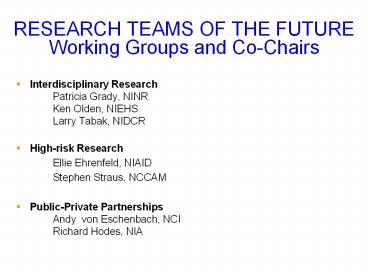RESEARCH TEAMS OF THE FUTURE Working Groups and Co-Chairs
Title:
RESEARCH TEAMS OF THE FUTURE Working Groups and Co-Chairs
Description:
RESEARCH TEAMS OF THE FUTURE Working Groups and Co-Chairs Interdisciplinary Research Patricia Grady, NINR Ken Olden, NIEHS Larry Tabak, NIDCR High-risk Research –
Number of Views:186
Avg rating:3.0/5.0
Title: RESEARCH TEAMS OF THE FUTURE Working Groups and Co-Chairs
1
RESEARCH TEAMS OF THE FUTUREWorking Groups and
Co-Chairs
- Interdisciplinary Research
- Patricia Grady, NINR
- Ken Olden, NIEHS
- Larry Tabak, NIDCR
- High-risk Research
- Ellie Ehrenfeld, NIAID
- Stephen Straus, NCCAM
- Public-Private Partnerships
- Andy von Eschenbach, NCI
- Richard Hodes, NIA
2
Research Teams of the FutureInterdisciplinary
Research
- Lawrence A. Tabak, D.D.S., Ph.D.
3
Multi- and Interdisciplinary Research
- Just definitions either prevent or put an end
to a dispute - Nathaniel Emm
4
Multi- and Interdisciplinary Research
A
A
Work on
Multidisciplinary
common problem
B
B
A
Interaction
Interdisciplinary
C
forges new discipline
B
5
More is different
- P.W. Anderson, Science
177, 393-396, 1972
6
Multi- and Interdisciplinary Research will be
Required to Solve the Puzzle of Complex
Diseases and Conditions
Genes Behavior Diet/Nutrition Infectious
agents Environment Society ???
7
(No Transcript)
8
Challenges to Interdisciplinary Research
- The current system of academic advancement favors
the independent investigator - Most institutions house scientists in discrete
departments - Interdisciplinary science requires
interdisciplinary peer-review - Project management and oversight is currently
performed by discrete ICs - Interdisciplinary research teams take time to
assemble and require unique resources
9
Research Teams of the FutureCurrent Roadmap RFAs
- Interdisciplinary Research
- Meetings and Networks for Methodological
Development in Interdisciplinary Research - Training for a New Interdisciplinary Research
Workforce - Supplements for Methodological Innovations in the
Behavioral and Social Sciences - Interdisciplinary Health Research Training
Behavior, Environment and Biology - Short Programs for Interdisciplinary Research
Training - Curriculum Development Award in Interdisciplinary
Research - Exploratory Centers (P20) for Interdisciplinary
Research - Public/Private Partnerships
- High Risk Research
- NIH Director's Pioneer Award
10
Exploratory Centers (P20) for Interdisciplinary
Research
- Purpose to plan exploratory centers that
overcome barriers to conducting
interdisciplinary research - How? Applicant organizations must describe their
plans to facilitate interdisciplinary research
- How the institution will distribute credit for
direct (and indirect) costs to reflect the
contributions of different components - How the institution will recognize the
contributions of the research team beyond the
Principal Investigator - How the institution attends to the careers of
"interstitial" team members who play important
roles in interdisciplinary research, but who are
not tenure track or eligible/appropriate to be
principal investigators on research grants.
11
Supplements for Methodological Innovations in the
Behavioral and Social Sciences
- Purpose to develop innovative methodology
(research design, data collection techniques,
measurement, and data analysis techniques) in
social and behavioral sciences research. - What?
- New technologies and the analytical complexities
associated with the integration of behavioral,
social, genetic, and biomedical data - Improved methods for performing research on
diverse populations or on potentially sensitive
or covert behaviors such as drug use, abuse, and
violence - Innovative experimental designs to study how
changes in economic, social, environmental,
physical, or political context affect all aspects
of ongoing research - Development and integration of behavioral and
social sciences measures with those of the
biomedical disciplines
12
- Research Teams of the Future
- Training, Career Development and High Risk
Research
Patricia A. Grady, Ph.D., R.N.
13
Transforming Research Training Interdisciplinary
research training is a prerequisite to
interdisciplinary research.
14
- Transforming Research Training means
- Linkages among biological, behavioral, social,
physical sciences - Collaboration between clinicians and scientists
- Partnerships with
industry
15
Research Teams of the Future 04 RFAs
- Interdisciplinary Research
- Meetings and Networks for Methodological
Development in Interdisciplinary Research - Training for a New Interdisciplinary Research
Workforce - Supplements for Methodological Innovations in the
Behavioral and Social Sciences - Interdisciplinary Health Research Training
Behavior, Environment and Biology - Short Programs for Interdisciplinary Research
Training - Curriculum Development Award in Interdisciplinary
Research - Exploratory Centers (P20) for Interdisciplinary
Research - High Risk Research
- NIH Director's Pioneer Award
16
Training for Interdisciplinary Research Workforce
- Develop and implement novel training programs
- Build upon existing multidisciplinary and
interdisciplinary institutional research programs
- Prepare individuals to lead or engage in team
approaches to solve complex health problems
17
Interdisciplinary Health Research Training
Behavior, Environment and Biology
- Formal coursework and research training in a new
interdisciplinary field for those having advanced
degree in a different discipline - Required to have behavioral or social science
discipline - Integration of behavioral/social with more
traditional biomedical
18
Curriculum Development Award in
Interdisciplinary Research
- Support the development of innovative courses and
curricula designed to train interdisciplinary
scientists - Curricula can be designed for undergraduate,
pre-doctoral or postdoctoral students, or
combinations - Focus on programs that encourage the integration
of quantitative, physical, behavioral, or social
sciences with the traditional biomedical sciences
19
Short Programs for Interdisciplinary Training
- Fusion of information, research practices and
technologies - Promote training in interdisciplines
- Students emerge with sufficient understanding of
a new discipline that they can meld it with their
previous training
20
High Risk Research
- To accelerate advances...
- Encourage high risk/high impact research
- Develop and test far-ranging ideas
- Implement novel programs
21
Traditional
Roadmap
- Outstanding individuals
- High risk/high impact research
- Novel programs
22
NIH Directors Pioneer Award
- New program to support individuals with untested,
potentially groundbreaking ideas! - Encourages innovation, risk-taking
- Totally new application and peer review process
- Expected to be highly competitive
- Expanded eligibility (not only traditional
biomedical investigators) - Provides 500,000/year for 5 years
23
Research involves taking risks































